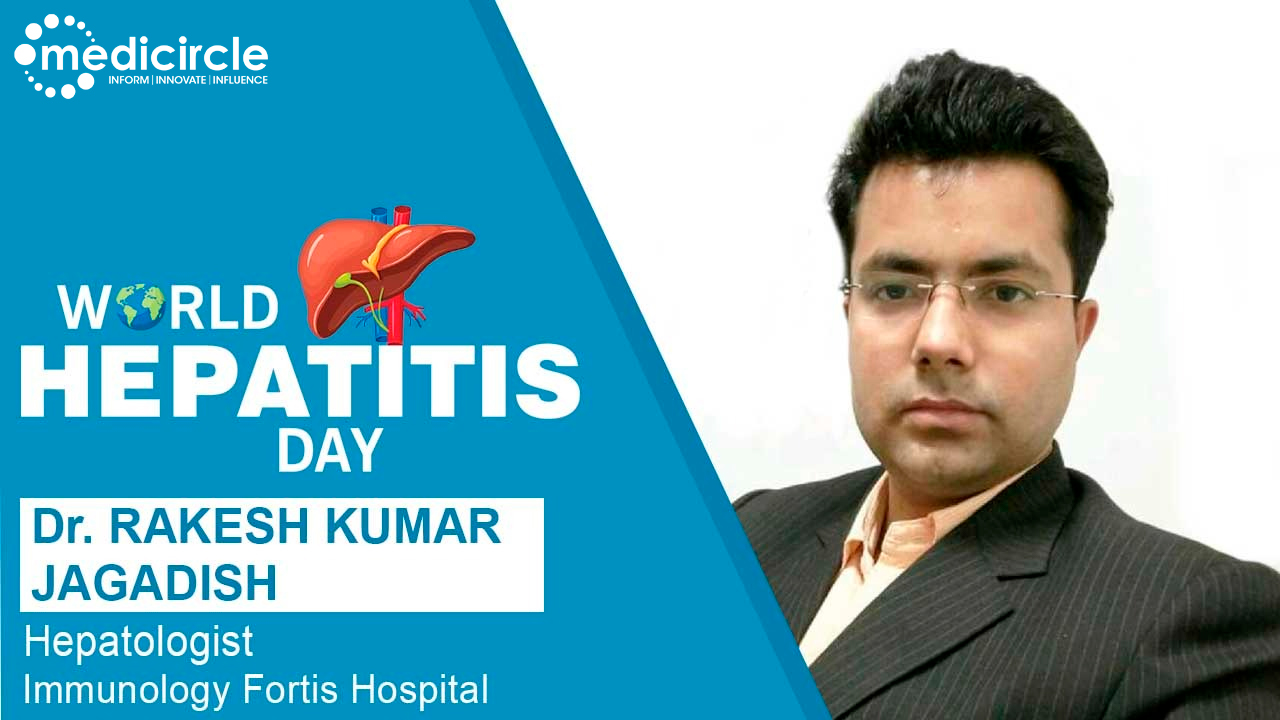According to WHO, Hepatitis is an inflammation of the liver that can cause a range of health problems and an estimated 325 million people worldwide live with hepatitis B or C. For most people, testing and treatment remain beyond reach. Medicircle is conducting a Hepatitis Awareness Series on the occasion of Hepatitis Awareness Month to spread information amongst people about the significance of testing for hepatitis, the availability of effective care and curative treatment, and the serious health consequences resulting from undiagnosed and untreated viral hepatitis.
Dr. Rakesh Kumar Jagdish is a renowned hepatologist in Noida and currently practices at Fortis Hospital in Fortis Hospital. He is trained from ILBS, Delhi. He has 10 years post-graduation in his field. He has experience in treating liver diseases, gastrointestinal diseases, endoscopy, liver transplants, immunological diseases, and liver-related problems.
Difference between the hepatitis A, B, C, D, E
Dr.Rakesh Kumar Jagdish says, “Hepatitis A, B, C, D, and E are 5 types of viral hepatitis.
Acute hepatitis: Hepatitis A and E is food and waterborne disease and are considered as acute illness which means they exist less than 6 months
Chronic hepatitis: Chronic hepatitis exists for more than 6 months.
Hepatitis means swelling and inflammation of the liver. Hepatitis may be a viral or nonviral-related infection. This means that it can be seen in diabetic patients or with patients related to high cholesterol.
Hepatitis A and E are waterborne which are caused due to contamination of food and water.
Hepatitis B and C are mainly caused due to blood transfusion or from mother to child or sexual contact or needle injection.
Vaccination for hepatitis
Dr.Rakesh informs, “Hepatitis A and B is preventable and you can be vaccinated for it. Hepatitis A vaccine occurs in childhood and children should be vaccinated. Hepatitis A in adulthood can cause severity with complications. Similar should be taken into consideration for Hepatitis B. If any pregnant patient has hepatitis, it can be prevented to be transferred to the newborn by giving an injection within 12 hours of birth. Hepatitis vaccines are easily available and Hep A and B vaccines can be easily clubbed together. The schedule is as follows: 0month-1 month- 6 months.”
Can diabetes increase the chances of hepatitis?
Dr.Rakesh states, “Yes, diabetes can increase and aggravate hepatitis. It may occur as NASH ( Non - Alcohol steatoHepatitis). NASH is a metabolic-associated liver disease and is more seen in diabetic patients. It is seen more in obese patients and is at higher risk of hepatitis which can increase the chances of complications like cirrhosis and liver problems.”
Viral hepatitis can trigger COVID
Dr.Rakesh states, “ Indirectly COVID cannot affect the hepatitis patients. But, indirectly it can affect the immune system by lowering it. If liver enzymes or liver swelling persists, then it can lead to severe illness. The low immunity can occur due to liver failure and cirrhosis.”
Message for Expert for hepatitis Day
Dr.Rakesh states, “ Avoid excess alcohol. Follow a healthy lifestyle by exercising regularly. Take your hepatitis vaccine if you have missed it. Awareness is must about hepatitis for a healthy liver.”
(Edited by Dr.Rati Parwani)

 Dr Rakesh Kumar Jagdish gives an overview of hepatitis disease and clears the doubts about hepatitis vaccination. He also says that hepatitis preventable disease and vaccination is very important. Stay tuned for the message from the expert at the end of the video which is inspiring from liver health
Dr Rakesh Kumar Jagdish gives an overview of hepatitis disease and clears the doubts about hepatitis vaccination. He also says that hepatitis preventable disease and vaccination is very important. Stay tuned for the message from the expert at the end of the video which is inspiring from liver health





.jpeg)
.jpeg)





.jpeg)






.jpeg)







.jpeg)





